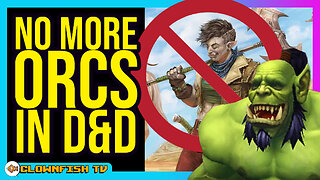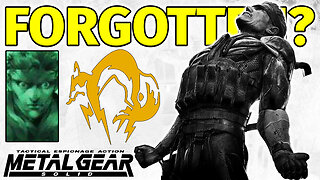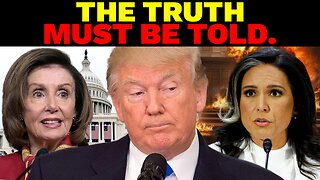Premium Only Content

Episode 1829: Divine Will or Human Agency?
I catch myself getting sucked into certain things and I literally have to shake my head to get out of what I call the trance of our “Human Agency.” It is truly amazing how we live in a kind of trance-like state throughout our lives and especially as we get older.
We are on a Robotic Secular Journey instead of a Pius Divine Journey. It is almost as if we have to deconstruct ourselves like many of the great saints before we can advance at all. But deconstruct we must.
In my interview with Nick Chapello he said, “Don’t listen to the noise but the message,” great point, we tend to do a ton of listening to the noise of this world but are not truly listening for Christs voice in any of it. We are crowding Christ out intentionally. We need to Turn off the feed, and turn on our soul. Between all our texts, IM’s, and email notifications, find your stillness. We all must Disconnect to reconnect with yourself, and then with something deeper much deeper than yourself – Christ. Try to get Beyond the like button, and find your own inner light.
In this regard the main question we must constantly ask ourselves when we wake up in the morning is why I was born and how do I serve our lord. I mean really believe the answers to those questions. Really believe in your faith. Really want to go out and teach your faith. Really want to go out and convert somebody but remember that does not mean you waste your time with those who are just trying to do mental gymnastics of the faith with no real desire to learn. No, in those cases simply move on and let the dead bury the dead. Your job as a practicing catholic is threefold:
1) Learn the faith
2) Pray
3) Teach
Notice I did not say debate. Why? How can you debate with someone who does not have the ability to understand what you are speaking about until they are taught. If they refuse to be taught move on because there are those who wish to be taught.
There are two statements around this matter.
The first is St. Alphonsus Liguori and the second Pope Benedict XIV, and although they are separated by a full century and half, in that AL Born: September 27, 1696,
Died: August 1, 1787 (age 90 years), and
PB 1 April 1927 – 31 December 2022 (age 93 years)
But they share a common narrative: one of divine authority, unquestioning faith, and outward displays of devotion.
So let me read you Liguori first: Now listen close
"By reason of His immensity, God is present everywhere; but there are two places where He dwells in a particular manner. One is in the highest heavens, where He is present by that glory which He communicates to the blessed; the other is on earth within the humble soul that loves Him."
Liguori's statement positions God as an all-powerful entity whose "immensity" dictates even his specific dwelling places. Does love for God stem from genuine devotion or fear of his omnipresence? Is the "humble soul" truly humble, or merely submitting to an overwhelming power?
Liguori reminds us that God's immensity encompasses all, yet chooses to dwell intimately in the "humble soul that loves Him." This dwelling is not merely geographical; it is a profound experience of grace where love becomes the bridge between humanity and divinity.
This raises questions about divine control and human agency doesn’t it?
Let me explain what those two means first.
Divine control and human agency are two theological concepts about the relationship between God's sovereignty and humanity's free will.
Divine control is the idea that God is all-powerful and all-knowing, and therefore has complete control over everything that happens. This includes the choices that humans make. Proponents of divine control argue that if God is truly all-powerful, then he must have predetermined everything that will happen, including our choices.
Human agency is the idea that humans have free will and are able to make their own choices. This means that we are not simply puppets being controlled by God, but that we have the ability to make our own decisions and shape our own destiny. Proponents of human agency argue that if we are truly free, then God cannot have complete control over everything that happens.
The relationship between divine control and human agency is a complex one, and there are a number of different ways to try to reconcile them. Some possible solutions include:
Compatibilism: This view holds that divine control and human agency are both compatible with each other. It is possible for God to know everything that will happen in advance, and for humans to still have free will. This is often explained by saying that God's knowledge of our choices does not cause them, but rather simply reflects what he knows we will freely choose to do.
Incompatibilism: This view holds that divine control and human agency are incompatible with each other. If God has complete control over everything that happens, then humans cannot truly have free will. Conversely, if humans have true free will, then God cannot have complete control over everything that happens.
The traditional Catholic Church does not endorse either Compatibilism or Incompatibilism regarding divine control and human agency. It acknowledges both God's sovereignty and human freedom.
Affirming divine sovereignty: Catholic theology emphasizes God's omnipotence aam·ni·puh·tns and omniscience (aam·ni·shns).
Omnipotence:
Definition: Omnipotence refers to the quality of being all-powerful. An omnipotent being is considered to have unlimited and infinite power, capable of doing anything that is logically possible.
Example: God is omnipotent because He has the ability to do anything.
Omniscience:
Definition: Omniscience means having all knowledge or knowing everything. An omniscient being is aware of all things past, present, and future. This includes knowledge of every event, thought, and possibility.
Example: God knows everything, including the thoughts and actions of individuals and the outcomes of all events.
God is the creator and sustainer of everything, including our free will. The Catechism states: " "So God created man to his own image: to the image of God he created him: male and female he created them. And God blessed them, saying: Increase and multiply, and fill the earth, and subdue it, and rule over the fishes of the sea, and the fowls of the air, and all living creatures that move upon the earth. And God said: Behold I have given you every herb bearing seed upon the earth, and all trees that have in themselves seed of their own kind, to be your meat: And to all beasts of the earth, and to every fowl of the air, and to all that move upon the earth, and wherein there is life, that they may have to feed upon. And it was so done. And God saw all the things that he had made, and they were very good. And the evening and morning were the sixth day." (Gen 1:27-31). This implies God's ultimate control over creation, including human agency.
Recognizing human freedom: Church teachings also uphold human freedom and responsibility. The Catechism declares: "Freedom is the power to choose what is good, to love, and to do what is just and true. It is the power, made possible by grace, to grow in the knowledge and love of God" (CCC 1730). The Church emphasizes moral accountability and repentance, implying humans have free will to choose their actions.
Does love for God stem from genuine devotion or fear of his omnipresence aam·ni·puh·tns? Is the "humble soul" truly humble, or merely submitting to an overwhelming power?
Traditional Teachings:
Emphasis on Divine Fear: Traditionally, the Church has emphasized "fear of the Lord" alongside love. This "fear" does not imply terror, but rather a reverential awe of God's power, majesty, and justice. It is seen as a necessary foundation for true love, motivating obedience and respect. This teaching draws from scriptures like Proverbs 9:10: "The fear of the Lord is the beginning of wisdom."
Love as the Ultimate Goal: However, genuine love for God is considered the ultimate goal. True fear paves the way for love, but does not replace it. This love is described as a free response to God's goodness, not out of compulsion or fear of punishment.
The Humble Soul: Traditional interpretations depict the "humble soul" as one who recognizes their limitations and dependence on God, submitting not out of fear but out of genuine self-awareness and love. This humility allows them to receive God's grace and grow in love.
Now let us read what Pope Benedict said:
“What made the holy apostles and martyrs endure fierce agony and bitter torments, except faith, and especially faith in the resurrection? What is it that today makes true followers of Christ cast luxuries aside, leave pleasures behind, and endure difficulties and pain? It is living faith that expresses itself through love . . . It is because of faith that we exchange the present for the future.”
Similarly, Benedict XIV's focus on "fierce agony" and "luxuries aside" paints a picture of suffering and sacrifice as inherent to true faith. This perspective aligns with traditional religious narratives that emphasize obedience and hardship as pathways to salvation. However, it is crucial to consider alternative interpretations. Could the "holy apostles and martyrs" have been motivated by social or political agendas, rather than solely by faith? Could prioritizing the "future" be a form of escapism from present injustices?
Furthermore, both statements emphasize outward expressions of faith, potentially neglecting the complexities of individual experience. While acts of love and compassion are undoubtedly positive, might equating them solely with religious devotion create a narrow definition of "true follower"? What about those who express love and good deeds through secular means? Are they excluded from this narrative?
Both the statements by Liguori and Benedict XIV point to the question of "true faith."
While God's presence dwells within the loving soul, it does not remain confined there. It becomes the wellspring from which love flows outward, inspiring acts of faith that transform not only us but also those around us.
Whether enduring hardship like the martyrs or making everyday sacrifices, it is this interplay between God's presence, faith, and love that shapes the lives of true believers.
As we cultivate the fertile ground of our inner connection with God through prayer, reflection, and love, we become instruments of grace, leaving the world a little brighter and more Christ-like with each act of faith and compassion.
-
 LIVE
LIVE
Major League Fishing
3 days agoLIVE! - Bass Pro Tour: Stage 1 - Day 3
772 watching -
 47:00
47:00
vinndoggradiousa
5 days agoBYE LEGACY MEDIA guest/ Sam Anthony of YourNews.com
5.7K -
 13:55
13:55
Clownfish TV
15 hours agoOrcs REMOVED from Dungeons & Dragons New Monster Manual?!
6.12K8 -
 15:38
15:38
Chris From The 740
6 hours ago $1.82 earnedThe EAA Girsan Match X 2311 : Premium Features, Unbeatable Value!
25.4K8 -
 14:23
14:23
Degenerate Jay
3 hours ago $0.25 earnedPeople Forgot What Metal Gear Solid Is?
13.6K3 -
 1:01:23
1:01:23
FamilyFriendlyGaming
17 hours ago $3.34 earnedCat Quest III Episode 14
30.4K -
 3:16:59
3:16:59
RG_GerkClan
5 hours ago🔴LIVE - Dominating One Raid at a Time - Escape From Tarkov - Gerk Clan
27.8K1 -
 1:49:43
1:49:43
Game On!
14 hours ago $2.12 earnedNFL Experts Top 10 Super Bowl Props!
23.3K2 -
 28:31
28:31
SB Mowing
1 day agoSiblings FEUD went so far the grass grew TALLER THAN THE HOUSE
76.5K13 -
 26:32
26:32
Stephen Gardner
16 hours ago🔥Tulsi Gabbard DROPS BOMBSHELL Obama Secret during hearing!
80.7K135